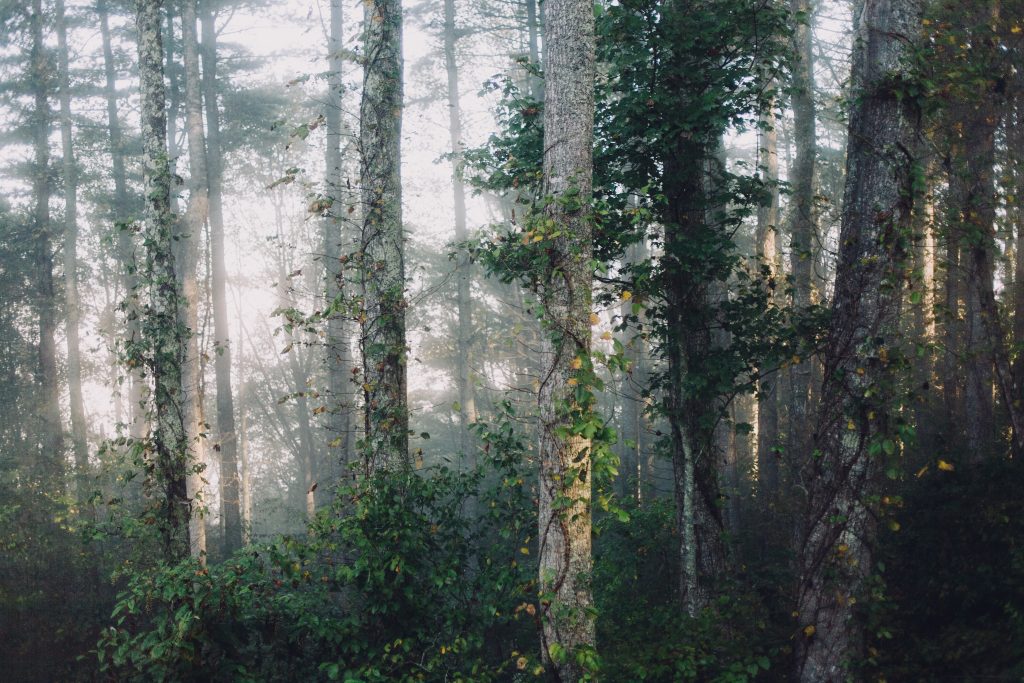
Unexpected Ways We Harm The Environment While Camping
You’ve probably heard the saying “pack it in, pack it out,” meaning you should leave nothing at your campsite that wasn’t there before. But as long as you pick up all of your trash, the environment will be fine, right?
Wrong. The truth is that there are many other ways to cause unintentional damage. If you’re not careful, camping can be extremely detrimental to the ecosystem.
Taking, damaging, or rearranging natural objects
If you’ve ever been to the beach or gone on a hike, you know how easy it is for an interesting rock, shell, or flower to catch your eye. You’ve probably taken a natural souvenir home from your trip at least once (I know I have).
While it may be tempting, removing any natural element can upset the delicate ecological balance that exists in even the tiniest of habitats. That rock you brought home may have sheltered a variety of different organisms. The shell was a potential home for a hermit crab. The flower you picked played an important role in the process of pollination.
This isn’t to say that you can never again bring home a flower or seashell (although it is illegal to take rocks from any U.S. national park), but keep in mind that every change you make to your surroundings impacts the environment as a whole.
Another common yet destructive practice is trail marking. Some hikers find their way through the desert by rearranging the rocks to build cairns or by scratching their initials into the stone. Not only does this ruin the natural view for other hikers, but it can also destroy animal homes and catalyze the process of erosion.
Blazing or carving into trees is possibly the most disastrous habit of all, since it exposes the tree to diseases that could eventually kill it. No one wants to be responsible for the fall of a 500-year-old sequoia.
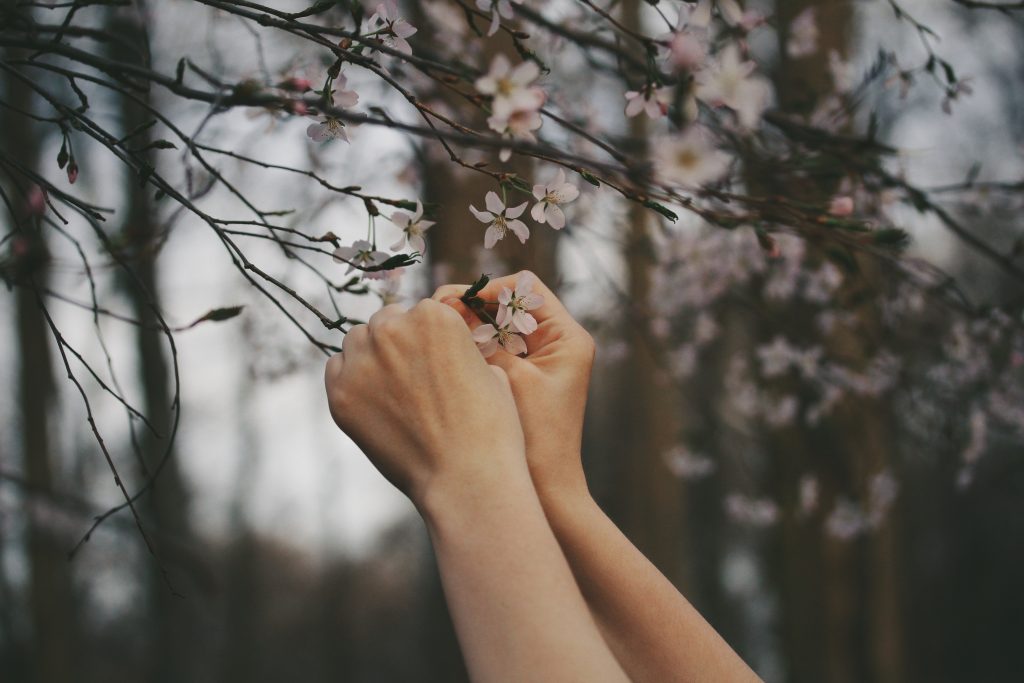
Photo by Michael Larosa/Unsplash
Introducing invasive species
Sometimes you can even bring a bit of nature home with you and not realize it. Invasive species spread from place to place by hitching a ride on cars, RVs, shoes, clothing, and pets.
Some species are incredibly damaging to the ecosystem and can choke out natural wildlife. Become more aware of invasive plants and animals and take a look at this invasive species list.
Before your trip, remember to wash any seeds, spores, or insects off of your vehicles and clothing. Do the same before returning home.
Creating chemical pollution
Do you plan to set up camp next to a leisurely brook, whip out the dish soap, and start scrubbing your plates in the stream? If so, you might want to take a second and reconsider.
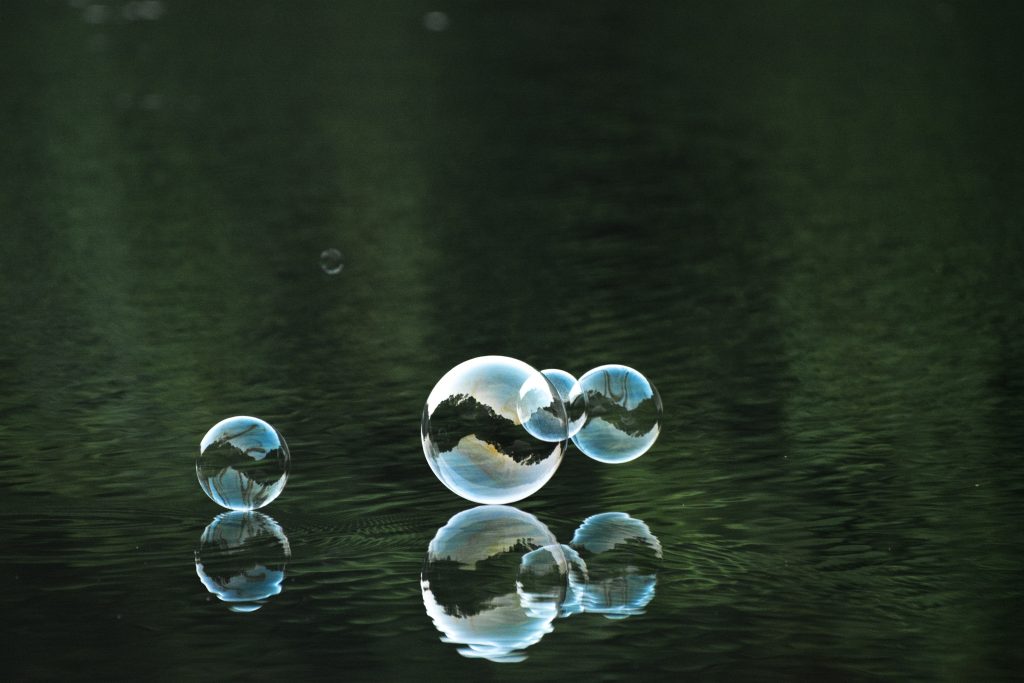
Photo by Andrew Wulf/Unsplash
Soap, shampoo, toothpaste, and other cleaning products often contain chemicals that can do a lot of damage to the environment. If absolutely necessary, use a small amount of biodegradable soap.
Camp at least 200 feet away from a natural water source—any closer, and cleaners can leach into the water, poisoning animals that live in it or drink from it.
Even bug spray and sunscreen can be environmentally harmful. Chemicals from sprays can pollute the air, while lotions can wash off into the water and kill marine life. Try to use non-chemical bug sprays and sunscreens, and allow them to dry before going swimming.
Creating mechanical pollution
While toys like dirt bikes and ATVs can be fun, they can also damage the air and landscape if overused. Ride only in designated areas so as not to cause extra erosion, and minimize the time you spend on your vehicle.
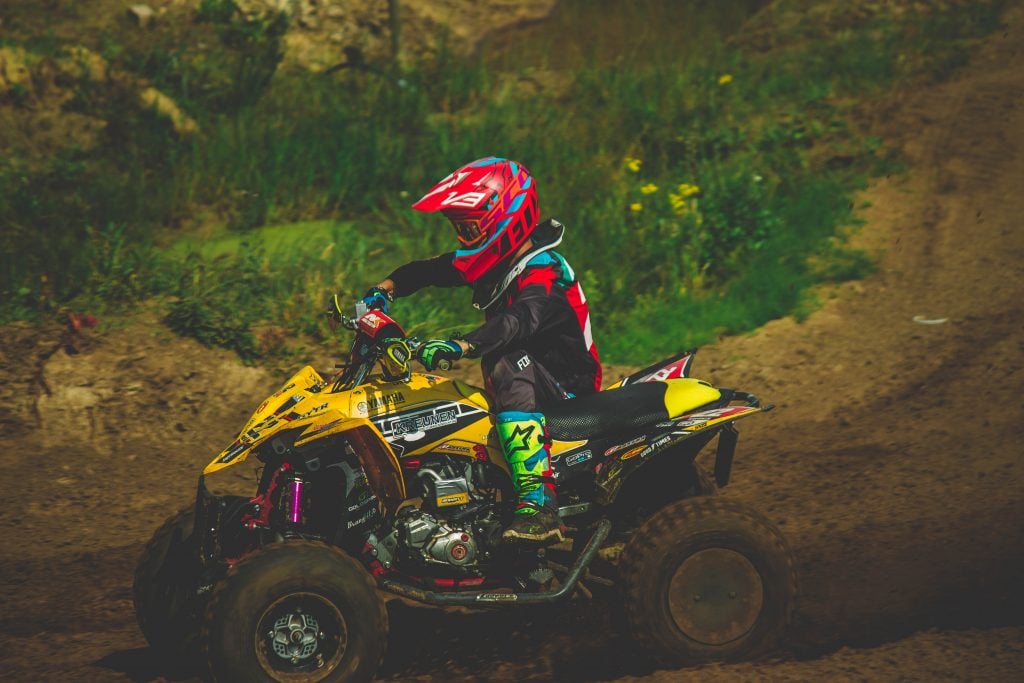
Photo by Koen Van Ginkel/Unsplash
Try other, more eco-friendly activities, like riding bicycles or going for a hike. If you have a generator in your RV, use it to charge your battery rather than running it constantly. Not only do they consume fuel, but generators also pollute the air with carbon dioxide and unnecessary noise.
Disposing of trash improperly
Everyone knows that littering harms the environment, but even disposing of trash can be harmful if done the wrong way. When putting garbage into a trash bag, sort out the recyclables from the non-recyclables. Those who recycle at home on a regular basis often don’t take the time to put glass and plastic in a separate bag while camping.
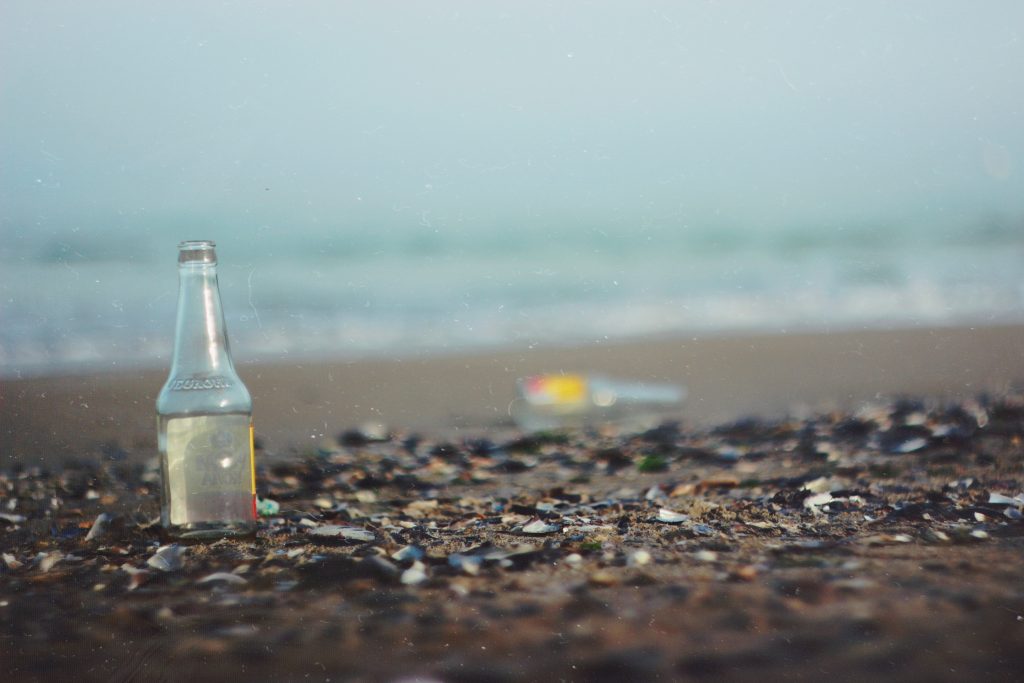
Photo by Vova Drozdey/Unsplash
Don’t bury your toilet paper—yes, it is biodegradable, but it still takes several months to decompose. Animals sometimes dig it up and spread it around the woods, which would be very unpleasant for future campers. Be sure to collect all your trash; even something as simple as a plastic 6-pack holder will take 5 centuries to decompose and can easily strangle small animals.
Food scraps and leftovers also qualify as trash. Don’t “leave it for the birds” as you might have been told. Pick up all large scraps and put them in a trash bag. Dispose of your trash in a campground dumpster or bring it inside your RV, unless you want some furry visitors in the middle of the night. Never feed the local wildlife; not only can it make them aggressive toward humans, but it can also make them very sick.
Building campfires
Nothing says “camping” like a campfire—but nothing says “environmental damage” like a hazardous campfire. Anywhere a fire is built, the natural process of decomposition is interrupted and the soil loses its quality.
Sparks can fly into nearby dry grass and underground roots can smolder, increasing the risk of wildfires. Only build a fire if you have to—campfires consume precious wood, create smoke that pollutes the air, and leave ashes on the ground. Try using a camping stove to cook meals instead of tossing them over the flames.
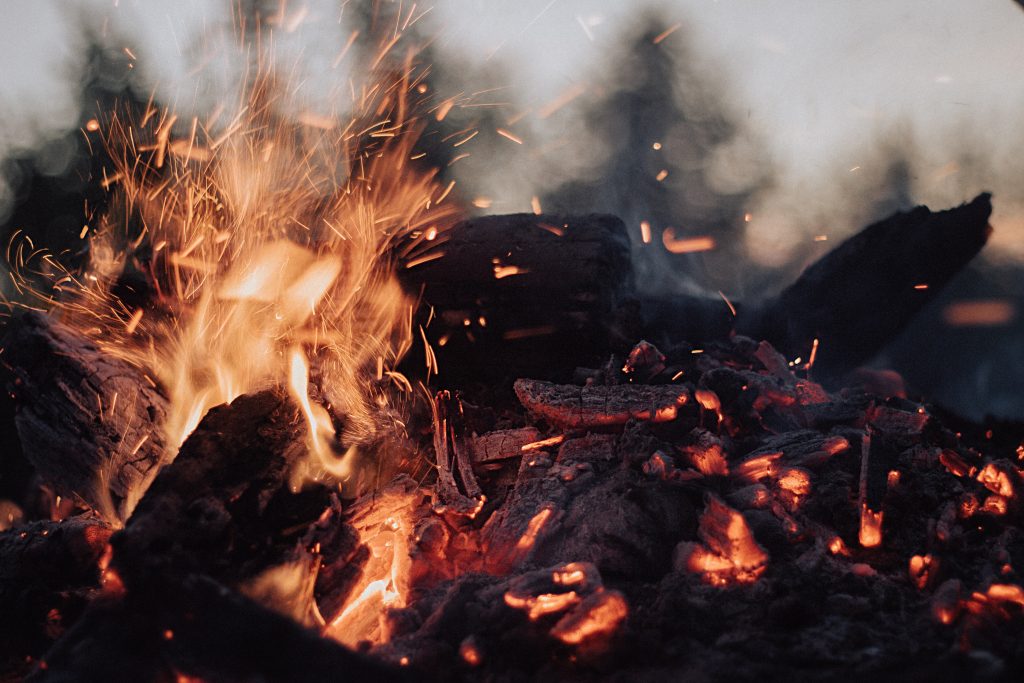
Photo by Almos Bechtold/Unsplash
Wood and dry leaves are safe to burn, but never try to burn trash like plastic bottles, styrofoam dishes, or aluminum cans. Chemicals from synthetic materials can leave behind toxic residues when burned, as well as release harmful gasses into the air. Pieces of paper or cardboard can also fly out of the flames and start wildfires. If you do plan to build a fire, use existing fire rings and proper fuel.
This earth is the only one we’ve got, so don’t ruin it on your vacation. Let’s work together to protect wild places so that future generations can enjoy camping as well. Be mindful of the environment and camp responsibly.

Very good article. Add cigarette butts to the list of things not to leave behind.
recycle plastic bags, bottles, styrofoam plates, cans (both steel and aluminum), pick up tangled fishing line.
I take a plastic bag from my tube bin under the RV sink and while on my morning walk, Walmart parking lot, camp site or rest stop, where ever I happen to be walking, and pick up everything that doesn’t belong. Cigarette butts, other plastic bags, bits of glass and rubber, cans & cups, bottles anything that’s not part of the environment.
On a recent trip through Florida at a rest stop, I found a packed wallet from a retired NY firefighter. I had to do some investigation and got his cell number and actually talked to him on the road, We were headed the same way and rejoined him with his wallet and money.
Picking up trash while getting exercise is fun and rewarding.
We do this a lot also, but mostly in the parks or woods, and along trails. Amazes me how much trash people will throw down in an area they came to enjoy. I have returned from hikes with a full backpack of trash.
Thank you Tom, I’m glad you enjoyed this article!
It’s definitely important to pick up cigarette butts along with the rest of your trash. Cigarettes can leach poisonous chemicals into the ground and even into drinking water.
I hike and police my campsite with a plastic grocery bag to effect reverse pollution.
I think you went a little overboard here. Making the comment : “Only build a fire if you have to” ~ REALLY? Whom determines that? You? Or, some Psycho Environmental group? Here we go again, with the same folks that want others to mind their own business and stay out of their lives. Putting their self-righteous GUILT trip on others! Here is the simple version folks. Do not take anything but photos, and and do NOT leave anything, but memories. Anything more, is like being lectured by a hyperbolic person. We do camp, and most of us have been doing so for years. So, we do NOT need to be preached about invasive species, and things like moving firewood. Of course that brings up another problem. If you bring wood with you, you risk bringing in evasive species with you (Ash Borer [beatle] ). And, if you buy the Firewood at the campground, are you consuming precious wood, that cannot be replaced?
Thank you for your feedback, Joseph.
I apologize if anyone found this article offensive or judgmental in any way. My purpose was not to “preach” or tell you how to camp. I only wanted to point out some of the ways we might not realize we are harming the environment. Everything we do has an impact on the earth in some way, so it’s up to us to decide how cautious we will be. I only hoped to spread awareness in this article, so I’m sorry if some of my statements came across as commands instead of suggestions.
I wanted to add that some of us were raised either by people who were not environmentalists, or in a very different time. I’ve been camping for 50 years and picked up some tips in this article. The world is changing, and we have to keep up. In 1970, we stuck our cups under the waterfalls to drink… we didn’t bring plastic bottles! We also took home our unused firewood. Thanks for a helpful article.
Thanks for the feedback, Heather! I’m glad you found this post helpful.
Keeping up with a changing world is NOT an imperative! Drug addiction, alcoholism, revolving door marriages, and over the top enviro-ocd are very popular and growing trends which are not things I wish to “keep up” with, to name a few.
Most of the ideas I see advanced only apply to the top 5% income bracket.
So I assume you travel purely by foot. Thus not contributing to the carbon imprint on the earth. Must make it a bitch getting to work! Do you have any statistics on how many areas are affected from native american camp fire pits from the past?
Well it always amazes me that those who preach about humans destroying or hurting the earth are not always correct on their assumptions. For example in south Orange County, California there was. Wonderful 5,000 acre off-road motorcycle park. It had all the best trails, roads and families enjoyed riding there for 20 years. The land became valuable and was sold. A huge planned development was then put in with a multitude of parks. All the fits and roads caused by the dirt bikes grew back, no pollution issues from the bikes or cars or people who enjoyed the Off-road Park. Is was not the end of any environmental issue and looks nice today. Does that mean we can just pollute and abuse? No, but let’s be realistic on our enjoyment of land. It isn’t 100% to be off limits, just use with common sense and courtesy to all.
NOT polluting water sources is important for all of mankind and littering needs to be avoided, but the rest…hmmm??? In 2000 I re-walk Colin Fletcher’s “1000 Mile Summer”. For those that are unfamiliar, he walked the eastern side length of California in the late 50’s and wrote the book. My point is, I saw a lot of country, the good, the bad and the ugly.
First, the ugly was every town I needed to go through to resupply and as I walked away it got less and less ugly. The bad, was mostly the idiots and unkind people along the path. So now for the good… there is STILL plenty of wonderful spots to enjoy. The exception is when polluted water from one area floats downstream to another area leaving it nasty.
Many of us are not turned off when we come to a existing campfire spot unless there is trash/litter left behind, or it’s not completely put out. THEN it’s a problem!!! If I don’t want to see campfire spots along my path… maybe I shouldn’t walk a popular trail where many people (idiots and unkind) walked before.
Is it sad that many more people are walking the PCT, CDT, and AT? Yes!!! That is why I walked Fletcher’s to avoid all of the crap people leave behind. Fletcher’s path on the 1000 Mile Summer is nothing like the PCT/CDT/AT. Those are like going to Disney World to get away from the crowds!!! Several times I went 1-1/2 to 2 weeks without seeing anyone! You will never get that on those trails!!!
Think about it this way… few of us here, if any want L.A.’s, Seattle’s, New York City’s, ETC. trash on our trails, but it’s going to happen. That’s called reality… a few bad apples. I’m not saying we shouldn’t care, but let’s first care about the more important things, like forest management and Water.
Right now (Aug 2018) No. Calif and So. Oregon are on fire and I’m not worried about a campfire ring or two. Nor about some litter on a trail that just went up in smoke…. but the funky soapy water upstream will still be soapy downstream.
Another point I believe worth mentioning, was the Ancient’s rock art really art or was it graffiti in their day as well? I don’t know, nor do I care a lot about it and ours… my point is this, Yosemite used to allow bonfires to be pushed off the cliffs at night and in its day it was all the rave. Now it’s not allowed, but I for one would have loved to see it back then. As long as it didn’t start a forest fire… hmmm.. okay!
The point is, one man’s trash is another man’s treasure. I can think of many, many times quadding, hiking, trucking out in the wild places to look at “People Junk.” such as, Mining camps and shafts (think Bodie State Park), Indian “art”, cabins in the mountains, etc.
Once standing at the midway point of the 1000 Mile Summer hike, middle of nowhere, miles and miles from people, when I came across a “Coke” brand bottle I found myself standing in awe. Did I get mad… NO… for the next several days I thought about, how did it get there, who may have dropped it (discarded/littered), what the back story was. I found myself entertained for a long while. The bottle was an old one and I had always wanted to ask Coke to give me a date on it as I never recall seeing that style before.
So here’s a question for all of you, should I have left it to entertain others who may stumble upon it or pack it out? Should we go clean up the graffiti the Indians/Ancients left behind? Personally, I don’t have all of the answers, BUT what I do know is for 6 months walking the east side of California, right through the heart of Death Valley and on to Oregon, WATER purity was of the most importance!
Depending on where these issues take place depends a great deal on how much of a real problem they are… with little wind and rain to wash away Man’s mark, stagecoach tracks last a long, long time. But how many of us love the idea of walking the Oregon trail seeing those ruts?
Water, water, water is the most important issue!!! THAT has to always be the most important item concerned about as the rest usually are one’s opinion of importance!
I just looked at the time and realized I dumped all over you guys…. too much coffee! Have a great day and enjoy the great outdoors wherever you go and how ever you get there just remember don’t pollute the water and scenery with anything. Liked mention by others, Take only pictures and leave only footprints!!!
Again, I cannot speak to the intelligence or lack of, in people. But to assume that being out in Nature, is thereby destroying Nature is silly. Yes, when MANY people visit popular sites like Yosemite they cause damage to trails, and unfortunately they leave behind trash. But, that is why the National Park Service made a recent AD campaign. National Parks: A Love Story. It details the need to make repairs to trails, roads, bridges, and visitor centers. Since, over 300 Million people visiting yearly. Repairs are constantly needed. But, if National Parks were off Limits to ALL, how would the NPS gain and keep public support?
Thanks for the great information. Much appreciated
Thanks Richard, I’m glad you found this article helpful!
So, now you can’t use bug spray? Give me a break! If you REALLY don’t want to “harm” the environment, DON’T GO! There is absolutely no way you can go out into the environment and NOT have some measurable impact.
Thank you for your input, Tom, you are absolutely right.
There is really no way we can do anything at all without “harming” the environment. By writing this article, I was not trying to tell anyone what they can or can’t do. I only hoped to highlight some of the ways that we can be more mindful.
Sure, one person spraying a chemical bug spray or sunscreen is not going to have a noticeable impact, but when generation after generation continues to follow these same habits without caution, a very harmful and noticeable amount of pollution builds up. If everyone chose to use biodegradable bug spray over a DEET-based brand, the environment would benefit.
It’s not up to me to dictate how you choose to camp, what brands of bug spray you buy, or how often you build fires. My role in this article was to educate people on some of the less obvious ways that we harm the environment. The facts I stated are meant to make you think; what you decide to do about it afterward is up to you.
Here is my gripe with this thread. This is supposed to be “RV Life”, and a contribution to that Medium. So, yes some RV’ers Might decide to go off the beaten path, and Hike a 1000 miles. But, not many. Given that, why parade a list of pet peeves here? Why not post on a venue designed for backpackers or hikers? I mean listing things like NOT leaving stuff like COKE cans is no-brainer for me. I cannot speak for others, but I would take an educated guess that RV’ers in General hold the same values as BOY/GIRL Scouts. That is to police any areas we set up camp, before to look for dangers like glass, metal, or poisonous plants (IVY, SUMAC). And after we camp, to leave “NO TRACE”. As far as Soapy Water goes, we used a minimum of soap on backpacking trips (Boy Scouts) [ we were told that everything that goes with you, must be brought back out] , and any soapy water (we used hand sanitizer to bathe) was contained and taken with us, so NOT to harm the ecosystem. And that is why I do NOT understand this on a RV site. Most ALL RV’s have self-contained systems that keep Black Water (Toilet) and Grey Water safely on board and out of the ecosystem. Then contents are dumped at designated dump stations.
I am very happy that you are a good Unfortunately, not everyone has been a Boy or Girl Scout. Most, but not all of us, try to leave a camping spot or hiking path, as good, or better, than they found it. In my travels, ( Full Time) I do love to go hiking and bike ride on the back trails. I have seen places where people, in RV’s, have dumped their holding tanks, on the ground, before leaving their spot. They have left trash scatered everywhere or just plain don’t care what they have done. Hikers have destroyed things, by climbing on them, or taken things for souvenirs. You are living in a perfect world, or thinking of a time, when people had more concern for, the enviroment, other people, or even historical things.
I thought this thread was good, for trying to remind those, that need to be reminded all the time, that once certain things are gone or destroyed, it is too late to fix them or bring them back, they may be gone forever. It only takes one or two
A quick apology… sometimes I sit down to my laptop and respond to many different blogs about different outdoor activities, this being one of those moments when I didn’t consider which one I was responding to so I am sorry for crossing over from RVing to hiking. I spend lots of time outdoors many different ways and believe there are some people who care and are concerned about how they impact people and places and many more that don’t. Again, I’m sorry for crossing over…
California is being destroyed by fire that could have been prevented by using controlled burns and managed tree farms to get rid of undergrowth that fuels the fires now consuming tons of trees that would have supplied huge amounts of timber to feed the hungry building trade of our country. Environmentalists would rather our forests to be burned rather than cutting down one tree. Remember that as we camp near huge bare burned over forests this fall
.
This article was more than a little exasperating to read. To be fair, the author makes some good points, but on the whole, the article seems to take the stance that every animal, and or species found in the wild has a right to be there, except us humans.
Bears, Deer, Elk and Moose tear the bark off trees, fire ants defend their ant hills with bites capable of sending a percentage of nearly all warm-blooded creatures into anaphylactic shock, and Beavers…don’t even let me get started on beavers. But you humans, you better not pick up a rock you find interesting. If you do, you are violating the sanctity of some other creatures domain.
This is an unhealthy, unrealistic viewpoint that makes it all the more difficult to attempt to enjoy, and feel at home in the out-of-doors, as it pits humans against nature, Instead of embracing the fact that we, like all other animals, are part of nature.
This is not to say that we should not be careful, and responsible, with our trash, our fires, and the equipment we use for travel and fun. Or that we need not be concerned about the impact we have when we upset the home of some woodland creature or other. We should be careful and mindful.
However, I draw the line on any level of self-imposed “camping guilt” at the use of Bug Spray. Lots of bugs use sophisticated chemical weapons to extract blood, cause pain, or kill as the case may be. The idea that I should not use my own chemical defenses against these sophisticated attics is asking too much…far too much, from a being that has every right to be here in the first place.
Sorry if you don’t agree .
.
Thank you for your thoughtful reply to this article! I really appreciate your fact-based logic.
I’m sorry if this article came across as though it took a “human versus nature” stance. That was not my intention. I agree that we have as much right to be here as every other species on the planet; however, the fact that humans have more power than plants or animals means that we also have a greater responsibility. I’m not saying that you can’t pick flowers or collect seashells—I only wanted to remind people that humans share this earth with millions of species, so we should be aware of the impact we make on the environment.
Of course animals damage the environment as well. But you probably won’t see a raccoon riding an ATV through the forest. We should be extra careful when bringing in things that are not found in nature—bug spray, for example. While insects produce sophisticated natural chemicals, many common brands of bug spray contain synthetic chemicals that just don’t mix with the environment. I’m not saying you shouldn’t use bug spray, but like I mentioned in the article, it can be beneficial to “use non-chemical bug sprays”. If you decide to use a DEET-based spray, there’s no reason to feel guilty. You aren’t going to destroy the environment single-handedly. But if you are looking for ways to reduce environmental impact while camping, using alternative bug sprays is a suggestion.
Thanks again for your feedback, and I hope this helps clear up any confusion.
I agree completely! Quite frankly, I’m tired of being told by environmentalists that humans are the only thing on this planet that doesn’t belong here, like we somehow came here from another planet and are an invasive species.. We ARE just as much a part of this world as any other organism. I’ve been camping/RVing, and even, god forbid, riding off-road vehicles for more than 50 years now. I have always treated the environment with respect, but certainly don’t believe that I am an outsider to it.
I have a solution…STAY HOME! According to you If you WALK ON THE GROUND you are destroying nature. Guess that puts a stop to camping and hiking.
Good One. So, I wonder if early man (Cave Men) got guilted by Militant Environmentalist for making Fires to Cook, or picking up Rocks to Make tools? lol
I watched a guy a deep fry a turkey and then dump the oil down a shit house. Clearly he has no respect for his surroundings.
You are so right Just think of how pristine our lands would be if only those pioneers hadn’t scribbled all over “Newspaper Rock”, Or those silly Dino’s had only buried themselves deeper rather than to leave their bones around for Geologists to discover. If we didn’t leave some marks on our history, we would only have written histories, which would quite easily be destroyed, altered and re-interpreted to fit another agenda… say, something along the lines of this article?
This article throws the baby out with the bathwater. I believe in policing my area, following the rules of the Parks and using common sense. But come on, we all slough off thousands of skin cells a day which some kind of microscopic creatures feed on at some point, which would force us to wear bio hazard suits to enjoy nature.
Agenda 21 is a real plan and something everyone should be aware of.
Are you kidding me. I thought RV life was supposed to encourage the RV live, not discourage it. Yes, we need to be careful not to disturb the natural order of the environment. However, while there may be some minor consequences to the environment by camping, I will not give up bug spray so I can enjoy a beautiful sunset or discourage marking trails so it is safe for hikers to explore our beautiful natural resources. One other point, why have National and State Parks if we are not going to encourage their use.
While your points are valid, the tone of your article makes people who enjoy the RV life look like monsters that are out to destroy the world. If you are going to continue to discourage the RV live, maybe you need to reconsider the title of your blog.
Thank you for the feedback, Bob.
I apologize if this article came across in a harsh or chiding way. My goal was not at all to discourage the RV lifestyle or to tell people to avoid the outdoors. Yes, I went into detail on how we can all be more aware of the impact we have on the environment, but I did not intentionally discourage readers from exploring their natural surroundings.
There are several articles on this site and on other sites that describe possible RV problems or emergencies and how to avoid them. I hope that those articles don’t prevent anyone from wanting to go RVing, since they are written purely to educate campers on the risks and consequences of certain habits. This article was written with a similar purpose—to point out things that might happen and how you can choose to be cautious. I tried to suggest alternatives to certain commodities, such as non-chemical bug sprays. If we enjoy RVing so much, shouldn’t we do everything we can to make sure that future generations can enjoy it too?
Once again, I’m sorry for any discomfort and misunderstanding this article may have created, and I appreciate you taking the time to respond.
On the one hand, yes, many aspects of the natural world are vulnerable, largely because of unintended side effects. That has always been true. However, no-one wants to think about the unintended side effects of environmentalism itself. When DDT became the enemy, thousands of people, especially children in 3rd world areas died from mosquito borne malaria who would probably have lived otherwise. Electric vehicles are all the rage now, but no-one wants to talk about the negative impact of manufacturing lithium batteries. Part of the problem is that so much of the environental movement is propaganda; not telling the whole story, only the parts that support their point of view or pet project. Isn’t it interesting that the theory of natural selection, survival of the fittest etc. never comes up?
Hum? I said much of the same thing. But, Ella chose NOT to reply. Shocker.
I’m sorry if you missed my response, Joseph. I did reply to your first comment on August 11. Yours was one of the first comments I responded to. Here is the link to my reply: http://rvlife.com/environment-harm/#comment-188235
Yes, I see that you posted two additional comments on the same article, but as other readers had already entered into a discussion with you on those points, I did not feel the need to contribute further.
I have spent months hiking through the Grand Teton Mountains in Wyoming, and gone camping in a trailer cross country.
I can honestly say that I learned more about doing no harm while hiking, than I ever did while camping… The same amount of care and attention to detail, just isn’t there.
When I first went hiking and back-packing, i had the profound words and excellent teachings of fellow hiker,
Paul Petzoldt to follow and learn all the basics from.
I knew to only use fallen wood, and to never ever create a ring of stones to make my fire, as it would ruin those stones forever. His books taught us to use an area, and leave it as if we had never been there. It’s very difficult to do in a region covered with snow, but once below treeline, and the temperature warmed up, we discovered that we could spend several days in one place and leave without leaving much evidence of 30 people having stayed there… it was very gratifying.
Camping is much different. With your own little home, you aren’t as alert to the things around you. Things that are very comfortable to you every day, are typically glossed over because we are used to seeing them every day. We also are mor likely to do things in our campers, that we wouldn’t dream of on the trail…
While I do love the luxury of a trailer, I still love the peaceful serenity of camping, even more…
Yes, that’s true we are not aware of things we do while campaigning which eventually harms the environment and the surroundings I must agree with the article thanks for sharing across and letting people know about it what a great share!
Thank you for your feedback. That’s great to hear!